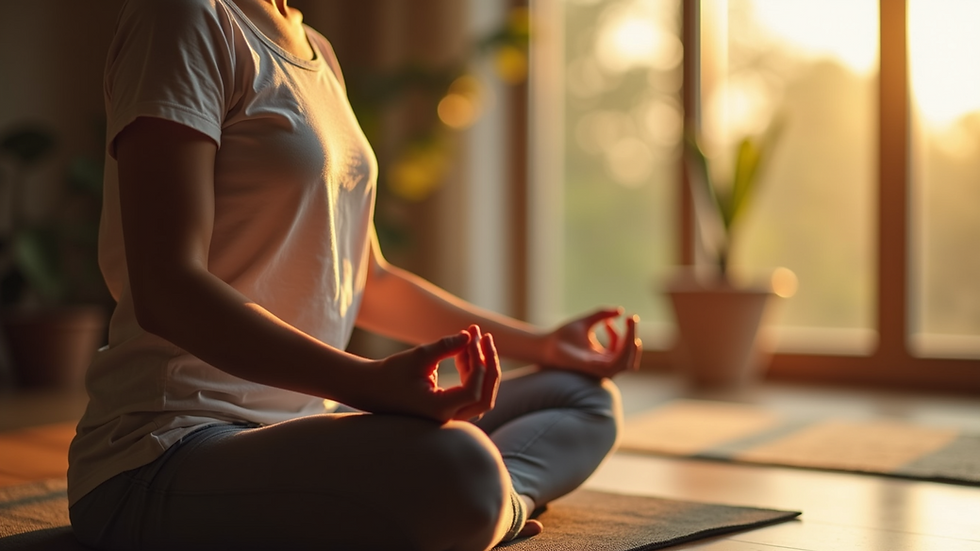Effective Strategies to Wipeout Your Anxiety Today
- Sydnie Kelman
- Sep 8
- 5 min read
Anxiety can feel like a heavy weight on your chest. It can creep in during quiet moments or hit you unexpectedly in the middle of a busy day. Many people experience anxiety, and it can be overwhelming. However, there are effective strategies to help you manage and reduce anxiety. In this post, we will explore practical techniques that you can start using today to wipe out your anxiety.
Understanding Anxiety
Before we dive into strategies, it is important to understand what anxiety is. Anxiety is a natural response to stress. It can manifest as worry, fear, or nervousness. While some anxiety is normal, excessive anxiety can interfere with daily life.
Recognizing the signs of anxiety is the first step. Common symptoms include:
Rapid heartbeat
Sweating
Restlessness
Difficulty concentrating
Understanding your anxiety can empower you to take control.
Breathing Techniques
One of the simplest ways to manage anxiety is through breathing techniques. Deep breathing can help calm your mind and body. Here’s a simple exercise you can try:
Find a comfortable position. Sit or lie down in a quiet space.
Inhale deeply through your nose for a count of four. Feel your belly expand.
Hold your breath for a count of four.
Exhale slowly through your mouth for a count of six. Imagine releasing your worries with each breath.
Repeat this cycle for a few minutes. You may notice a significant reduction in your anxiety levels.
Mindfulness and Meditation
Mindfulness is the practice of being present in the moment. It can help you break the cycle of anxious thoughts. Meditation is a great way to cultivate mindfulness. Here’s how to get started:
Choose a quiet space where you won’t be disturbed.
Sit comfortably and close your eyes.
Focus on your breath. Notice the sensation of air entering and leaving your body.
If your mind wanders, gently bring your focus back to your breath.
Start with just five minutes a day. Gradually increase the time as you become more comfortable.
Physical Activity
Exercise is a powerful tool for reducing anxiety. Physical activity releases endorphins, which are natural mood lifters. You don’t need to run a marathon to reap the benefits. Here are some simple ways to incorporate exercise into your routine:
Go for a walk in your neighborhood or a nearby park.
Try yoga. It combines physical movement with mindfulness.
Dance to your favorite music. It’s fun and gets your body moving.
Aim for at least 30 minutes of moderate exercise most days of the week.
Healthy Eating
What you eat can impact your mood and anxiety levels. A balanced diet can help you feel better both physically and mentally. Here are some tips for healthy eating:
Include plenty of fruits and vegetables. They are rich in vitamins and minerals.
Choose whole grains over refined grains. They provide steady energy.
Limit caffeine and sugar. Both can increase anxiety levels.
Staying hydrated is also important. Drink plenty of water throughout the day.
Sleep Hygiene
Lack of sleep can worsen anxiety. Establishing a good sleep routine can help you get the rest you need. Here are some tips for better sleep:
Set a regular sleep schedule. Go to bed and wake up at the same time every day.
Create a relaxing bedtime routine. This could include reading, taking a warm bath, or practicing relaxation techniques.
Limit screen time before bed. The blue light from screens can interfere with your sleep.
Aim for 7-9 hours of quality sleep each night.
Social Support
Connecting with others can help alleviate anxiety. Talking to friends or family about your feelings can provide relief. Here are some ways to build your support network:
Reach out to friends. Share your thoughts and feelings with someone you trust.
Join a support group. Many communities offer groups for people dealing with anxiety.
Consider professional help. A therapist can provide guidance and support tailored to your needs.
You don’t have to face anxiety alone.
Journaling
Writing down your thoughts can be a powerful way to process your feelings. Journaling can help you identify triggers and patterns in your anxiety. Here’s how to get started:
Set aside time each day to write. It could be in the morning or before bed.
Write freely. Don’t worry about grammar or structure. Just let your thoughts flow.
Reflect on your entries. Look for patterns or recurring themes in your anxiety.
Journaling can provide clarity and help you feel more in control.
Limiting News Consumption
In today’s world, constant news updates can increase anxiety. It is important to stay informed, but too much news can be overwhelming. Here are some tips to manage your news consumption:
Set specific times to check the news. Limit it to once or twice a day.
Choose reliable sources. Avoid sensationalist news that can heighten anxiety.
Take breaks from news altogether if you feel overwhelmed.
Protecting your mental health is essential.
Practicing Gratitude
Focusing on the positive aspects of your life can shift your mindset. Practicing gratitude can help reduce anxiety. Here’s how to incorporate gratitude into your daily routine:
Keep a gratitude journal. Write down three things you are grateful for each day.
Share your gratitude with others. Tell someone why you appreciate them.
Reflect on positive experiences. Take time to remember good moments in your life.
Gratitude can help you cultivate a more positive outlook.
Seeking Professional Help
If your anxiety feels unmanageable, seeking professional help is a strong step. Therapists and counselors can provide support and strategies tailored to your needs. Here are some options to consider:
Cognitive Behavioral Therapy (CBT). This is a common treatment for anxiety that helps change negative thought patterns.
Medication. In some cases, medication may be necessary to manage anxiety. Consult with a healthcare provider for guidance.
Support groups. Many communities offer support groups for those dealing with anxiety.
Remember, seeking help is a sign of strength.
Embracing Self-Compassion
Finally, be kind to yourself. Anxiety is a common experience, and it is okay to feel this way. Embracing self-compassion can help you navigate your feelings. Here are some ways to practice self-compassion:
Acknowledge your feelings. It is okay to feel anxious. Recognize your emotions without judgment.
Treat yourself with kindness. Speak to yourself as you would to a friend.
Practice self-care. Engage in activities that bring you joy and relaxation.
Self-compassion can help you build resilience against anxiety.
Moving Forward with Confidence
Anxiety can be challenging, but it is manageable. By implementing these strategies, you can take control of your anxiety and improve your overall well-being. Remember, it is a journey, and progress may take time.
Start with one or two strategies that resonate with you. As you become more comfortable, gradually incorporate more techniques into your routine.

You have the power to wipe out your anxiety today. Embrace these strategies and take the first step towards a calmer, more peaceful life.
%20copy%203.png)


Comments